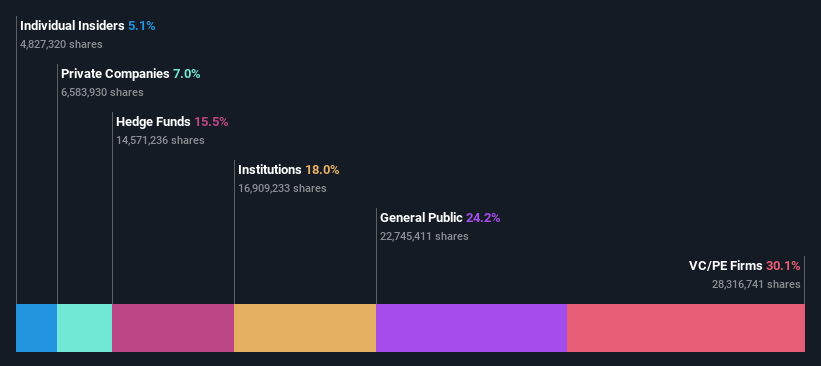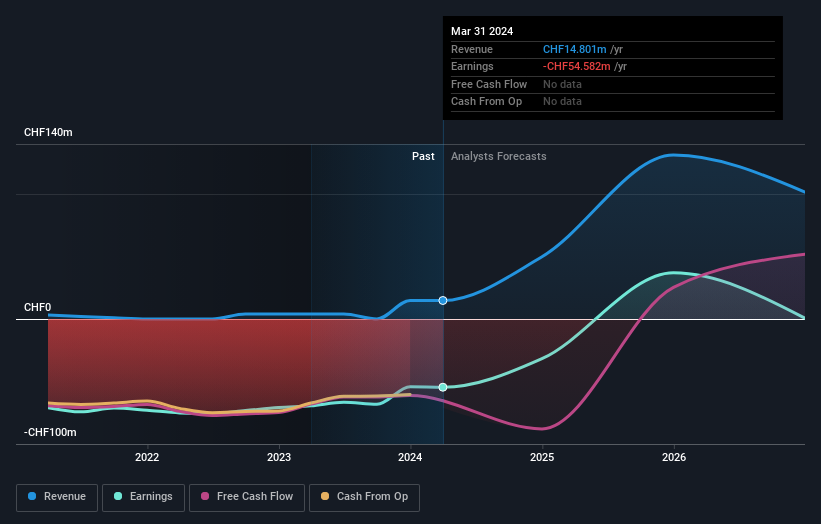Individual investors own 24% of AC Immune SA (NASDAQ:ACIU) shares but private equity firms control 30% of the company
Key Insights
The considerable ownership by private equity firms in AC Immune indicates that they collectively have a greater say in management and business strategy
The top 4 shareholders own 53% of the company
A look at the shareholders of AC Immune SA (NASDAQ:ACIU) can tell us which group is most powerful. We can see that private equity firms own the lion's share in the company with 30% ownership. Put another way, the group faces the maximum upside potential (or downside risk).
Meanwhile, individual investors make up 24% of the company’s shareholders.
Let's delve deeper into each type of owner of AC Immune, beginning with the chart below.
Check out our latest analysis for AC Immune
What Does The Institutional Ownership Tell Us About AC Immune?
Institutions typically measure themselves against a benchmark when reporting to their own investors, so they often become more enthusiastic about a stock once it's included in a major index. We would expect most companies to have some institutions on the register, especially if they are growing.
As you can see, institutional investors have a fair amount of stake in AC Immune. This can indicate that the company has a certain degree of credibility in the investment community. However, it is best to be wary of relying on the supposed validation that comes with institutional investors. They too, get it wrong sometimes. It is not uncommon to see a big share price drop if two large institutional investors try to sell out of a stock at the same time. So it is worth checking the past earnings trajectory of AC Immune, (below). Of course, keep in mind that there are other factors to consider, too.
It looks like hedge funds own 16% of AC Immune shares. That worth noting, since hedge funds are often quite active investors, who may try to influence management. Many want to see value creation (and a higher share price) in the short term or medium term. The company's largest shareholder is dievini Hopp BioTech holding GmbH & Co. KG, with ownership of 17%. Meanwhile, the second and third largest shareholders, hold 16% and 13%, of the shares outstanding, respectively. Additionally, the company's CEO Andrea Pfeifer directly holds 2.6% of the total shares outstanding.
To make our study more interesting, we found that the top 4 shareholders control more than half of the company which implies that this group has considerable sway over the company's decision-making.
While it makes sense to study institutional ownership data for a company, it also makes sense to study analyst sentiments to know which way the wind is blowing. There is some analyst coverage of the stock, but it could still become more well known, with time.
Insider Ownership Of AC Immune
While the precise definition of an insider can be subjective, almost everyone considers board members to be insiders. The company management answer to the board and the latter should represent the interests of shareholders. Notably, sometimes top-level managers are on the board themselves.
I generally consider insider ownership to be a good thing. However, on some occasions it makes it more difficult for other shareholders to hold the board accountable for decisions.
Our most recent data indicates that insiders own some shares in AC Immune SA. It has a market capitalization of just US$299m, and insiders have US$15m worth of shares, in their own names. Some would say this shows alignment of interests between shareholders and the board. But it might be worth checking if those insiders have been selling.
General Public Ownership
The general public-- including retail investors -- own 24% stake in the company, and hence can't easily be ignored. While this group can't necessarily call the shots, it can certainly have a real influence on how the company is run.
Private Equity Ownership
With a stake of 30%, private equity firms could influence the AC Immune board. Some might like this, because private equity are sometimes activists who hold management accountable. But other times, private equity is selling out, having taking the company public.
Private Company Ownership
It seems that Private Companies own 7.0%, of the AC Immune stock. Private companies may be related parties. Sometimes insiders have an interest in a public company through a holding in a private company, rather than in their own capacity as an individual. While it's hard to draw any broad stroke conclusions, it is worth noting as an area for further research.
Next Steps:
It's always worth thinking about the different groups who own shares in a company. But to understand AC Immune better, we need to consider many other factors. Take risks for example - AC Immune has 2 warning signs we think you should be aware of.
But ultimately it is the future, not the past, that will determine how well the owners of this business will do. Therefore we think it advisable to take a look at this free report showing whether analysts are predicting a brighter future.
NB: Figures in this article are calculated using data from the last twelve months, which refer to the 12-month period ending on the last date of the month the financial statement is dated. This may not be consistent with full year annual report figures.
Have feedback on this article? Concerned about the content? Get in touch with us directly. Alternatively, email editorial-team (at) simplywallst.com.
This article by Simply Wall St is general in nature. We provide commentary based on historical data and analyst forecasts only using an unbiased methodology and our articles are not intended to be financial advice. It does not constitute a recommendation to buy or sell any stock, and does not take account of your objectives, or your financial situation. We aim to bring you long-term focused analysis driven by fundamental data. Note that our analysis may not factor in the latest price-sensitive company announcements or qualitative material. Simply Wall St has no position in any stocks mentioned.

 Yahoo Finance
Yahoo Finance 

